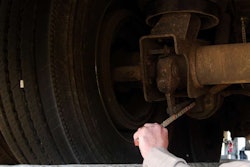Treadle valve corrosion
Among the highlights of the Federal Motor Carrier Safety Administration’s roadside-inspection seminar at the Mid-America Trucking Show in Louisville, Ky., were a question-and-answer portion in which former driver Allan Powell grilled the presenters on inspection procedures relative to his long work into what he sees as design flaws in E6 and E10 floor-mounted brake valves that go unnoticed by roadside inspectors and maintenance professionals. That long work was conducted during time Powell spent trying to clear himself of a vehicular manslaughter charge after a stuck treadle valve in his own truck resulted in an accident.
Despite the existence of a February 2012 Commercial Vehicle Safety Alliance bulletin to state and federal partners outlining inspection procedures for brake pedal and treadle assembly inspection, Powell contends too many inspectors simply don’t do them at the roadside. He urged Kentucky FMCSA division member Sean Anderson and other presenters to get the valve inspection into their procedures. “Does FMCSA want to help stop this problem?” he asked.
ELDs
In a round-up of some upcoming regulatory changes, Anderson detailed in brief the proposed mandate for interstate carriers to use electronic logging devices for hours of service compliance. Asked about a timeline for implementation, he spoke, he said, not as Sean Anderson of the FMCSA, but as a guy who knew a little about how new controversial rules typically go. “We’ll probably get sued again,” he said, “and that will push it back, or it just won’t be ready” in time for the agency’s hoped-for 2016 implementation.
DataQs issues remain front and center
Anderson reflected common thoughts from inspectors on the issue of adjudicated citations and whether the associated violations should or should not be allowed to continue to contribute to carriers’ Motor Carrier Management and Information Service data well, from which the CSA Safety Measurement System pulls the basis for its scoring. As of now, if a citation is thrown out or dismissed in a court of law, the DataQs process is the only recourse carriers and owner-operators have to attempt to get the violation removed from their carrier profiles.
While FMCSA has proposed methods of downgrading the importance of those violations in the CSA system, Anderson explained law enforcement’s position on many disputed items by noting the number of judges in his former jurisdiction with the Kentucky State Police who “have never heard of the FMCSA’s safety regulations,” he said. In order to get an adjudicated citation removed from the MCMIS database and CSA system, he advised drivers, “you’ve got to have some other evidence right now other than just the court’s throwing it out.”










